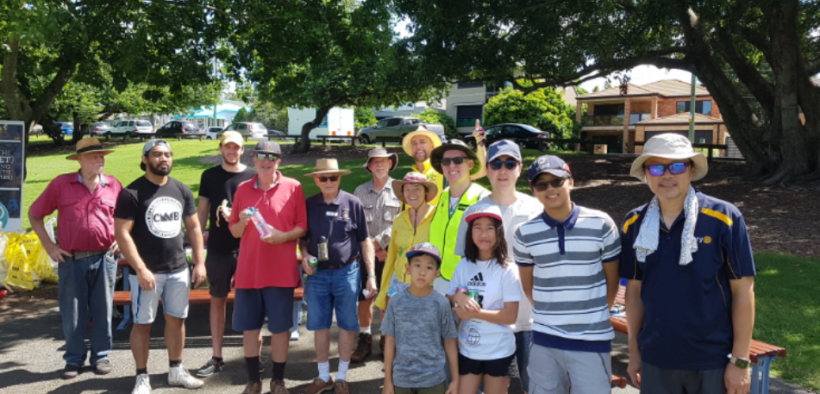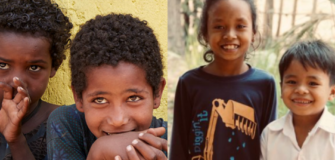Lived experiences and the future of the social enterprise space
Share

In anticipation for the Ethical Enterprise Conference 2020, join Founder and CEO of Moral Fairground Susanna Bevilacqua in a one on one conversation with 2018 winner of Healthy Land & Water’s Volunteer of the Year Award Mathew Townsend; in an investigation of the challenges faced by the differently-abled, an exploration of lived experiences and the future of the social enterprise space.
Q: Tell us a bit about yourself, and why you are passionate about social enterprise.
Mathew Townsend is a founder of Nature Freedom, a not-for-profit enterprise providing young people with disability with access to the natural environment. He is an adventurer, a public speaker about inclusive and accessible cities and sustainable development, and a voice for people with disability. In 2018 he was the winner of Healthy Land & Water’s Volunteer of the Year Award, and a finalist in the Queensland Outdoor Awards 2018 and 7NEWS Young Achievers Queensland Awards 2019. He has a Master of Environmental Management from the University of Queensland. Mathew regularly consults to government, environmental and private sector organisations leading workshops on social inclusion and physical accessibility.
His passion for social enterprise space is about creating positive social impacts as well as environmental impact through the lens of young people with lived experiences of disability and mental health. Social enterprises are the biggest solution addressing prolonged/ongoing high unemployment from youth and persons with disability to the existing employment programs that are not suitable for their individual needs. Many companies are not inclusive due to lack of lived experiences in disability, thus being a founder and/or CEO of living with disability enables to improve the quality of service provision and product. In the social enterprise space, it is powerful to show the impacts of lived experiences into mainstream settings.
Q. A lot of your work is around inclusivity, do you think our society is inclusive? If not why do you think this is?
The society is either inclusive and not inclusive. It depends on the culture, community, location and business. Although, the overall perspective of the society is not generally included. It can be seen as tokenistic for some people with disabilities seen as inspirational or a miracle to their environment.
There is a lot more work in this space about inclusion despite a lot of issues around violence, neglect, abuse and health issues. It is still a long way to go making it a 100% inclusive society.
Q. What does an inclusive society look like?
This is a really good question. Perhaps if someone in your network asks you this question, the answers are always different from another person’s perspective or experience. Generally, an inclusive society is based on how people communicate, approach, educate and interact with individuals. Putting them all together will make an inclusive society.
Q. How can we make an inclusive society possible?
An action or approach rather than ‘ask for someone to change their minds’. Sorry, activism does not work. You are pushing people to change their minds or behaviour. They won’t change because they are confused, angry at your actions and feel offended by their own behaviour. The best way to create positive change is to make ‘actions’. Help others how to understand about you, and the situation. Give them lessons, speak on their perspective and support. Be assertive in communication.
You may face people who are blatantly aggressive or ignorant, it’s your responsibility how to manage that. Best is to leave them alone, move on and focus on what responses to you in a positive manner. This is where actions are being addressed.
Q. Is there a commercial, social and economic benefit to having a more inclusive society?
Absolutely yes, especially in a social enterprise space. Having impact focused on people (social) before making profits for self-gain it is a way to make an inclusive society. It gives a lot of benefit to sustainability in the community and culture. It increases resilience and long-term strategy. Transparency, collaborations and empathy come together easily as it is a way forward to make this possible.
Q. As a person with a disability, what are or have your biggest challenges been, from a personal and professional perspective?
Accessibility is the first thing that faces challenges because lack of inclusion means lack of accessibility. So the awareness does not involve before or during my journey as part of many programs I have been involved professionally. I find it overwhelming to explain everything in repetitive nature about my disability because they do not understand. This comes to attention for lack of education opportunities for those people to understand disability. People’s listening skills are important!
Q. In your opinion, what impact has COVID on people that have disabilities?
Digital division, where being in lockdown and a person who has a lack of access nor an ability to access technology such as health, education and community. Literacy and numeracy language are other barriers to accessing technology. This means increased social anxiety and depression from isolation.
There are a lot of pre-existing challenges and barriers that PwD faces before the pandemic such as lack of accessibility in transport, education and community facilities. This equates further challenges in the new environment due to lack of empathy nor agenda for PwD being part of the contingency plans.
Q. In your opinion, what impact has COVID had on the sustainability/social impact agenda?
This is a really good question. I believe that it has not changed the way sustainable businesses and organisations are making a social impact, however, it relates to improving resilience in the performance of the agenda. This means the importance of maintaining the social impact and sustainability being part of corporate culture, and community awareness. The pandemic has increased understanding of agenda issues such as climate change, poverty, mental health and employment.
The positive image of 2020 (vision – no pun intended!), will make 2021 vision a better and new reality.
Susanna founded Moral Fairground in 2009 after having travelled in some of the poorest countries in South East Asia and witnessing first hand the working conditions and the environmental and social impact of mass consumerism she decided to dedicate her time setting up an enterprise whose goal is to a build thriving, collaborative and socially conscious community that’s making a positive impact. By creating dynamic platforms to connect both the traditional and conscious citizens to the conscious and emerging business sector, Moral Fairground represents and provides an opportunity to share knowledge and shape best practices in a supporting ethical space.

























